| Visual Basic (Declaration) | |
|---|---|
Public Class DeskewCheckCommand Inherits RasterCommand Implements IRasterCommand | |
| Visual Basic (Usage) |  Copy Code Copy Code |
|---|---|
| |
| C# | |
|---|---|
public class DeskewCheckCommand : RasterCommand, IRasterCommand | |
| Managed Extensions for C++ | |
|---|---|
public __gc class DeskewCheckCommand : public RasterCommand, IRasterCommand | |
| C++/CLI | |
|---|---|
public ref class DeskewCheckCommand : public RasterCommand, IRasterCommand | |
| Visual Basic |  Copy Code Copy Code |
|---|---|
ImageProcessing.Core.DeskewCheckCommand | |
| C# |  Copy Code Copy Code |
|---|---|
ImageProcessing.Core.DeskewCheckCommand | |
Like the DeskewCommand, you can use this method to automatically straighten scanned documents. With this command, the DeskewCommand class has been extended to work especially on bank check images. Different algorithms can be used (the normal deskew algorithm, a special bank check algorithm and a special line detection algorithm). If the Flags property or the flags parameter of the Constructor contains DeskewCheckCommandFlags.ReturnAngleOnly, the command will update the Angle property without rotating the image. This command includes an option to skip deskewing if the angle is very small. The amount of rotation is limited to a maximum of 20 degrees in either direction. This command is intended for images, like scanned bank checks, that are mainly horizontal lines of text. The results are less predictable with other types of images. This command does not support 12- or 16-bit grayscale or 48- or 64-bit color images, but will not throw an exception. This command does not support signed data images. This command does not support 32-bit grayscale images.
The original color image is shown in the following figure:
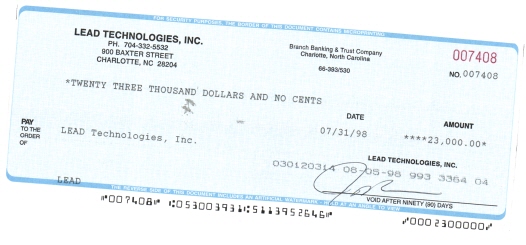
The deskewed color image is shown in the following figure:
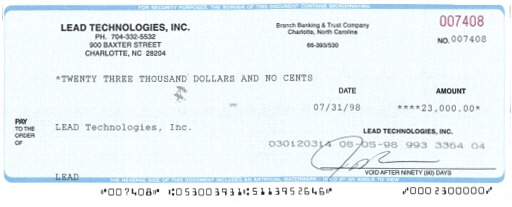
The original grayscale image is shown in the following figure:
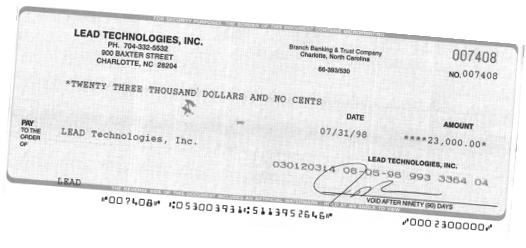
The deskewed grayscale image is shown in the following figure:
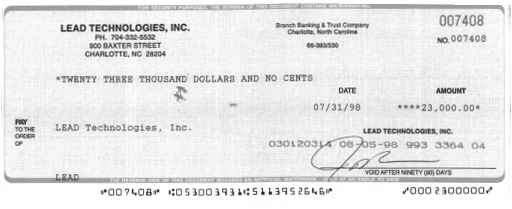
The original 1-bit image is shown in the following figure:
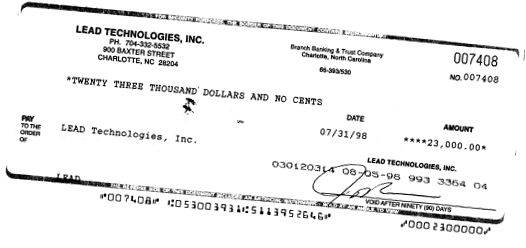
The deskewed 1-bit image is shown in the following figure:
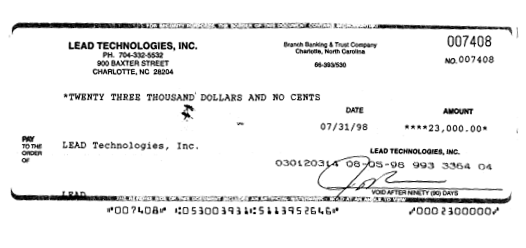 For more information, refer to Processing an Image
and Deskewing.
For more information, refer to Processing an Image
and Deskewing.
System.Object
Leadtools.ImageProcessing.RasterCommand
Leadtools.ImageProcessing.Core.DeskewCheckCommand
Target Platforms: Microsoft .NET Framework 2.0, Windows 98, Windows NT 4.0, Windows Millennium Edition, Windows 2000, Windows XP Home Edition, Windows XP Professional, Windows Server 2003 family
Reference
DeskewCheckCommand MembersLeadtools.ImageProcessing.Core Namespace
Processing an Image
DeskewCommand Class
DeskewExtendedCommand Class
DespeckleCommand Class
WindowLevelCommand Class
ApplyTransformationParametersCommand Class
GetRegistrationMarksCenterMass Method
GetTransformationParameters Method
IsRegistrationMark Method
SearchRegistrationMarksCommand Class




